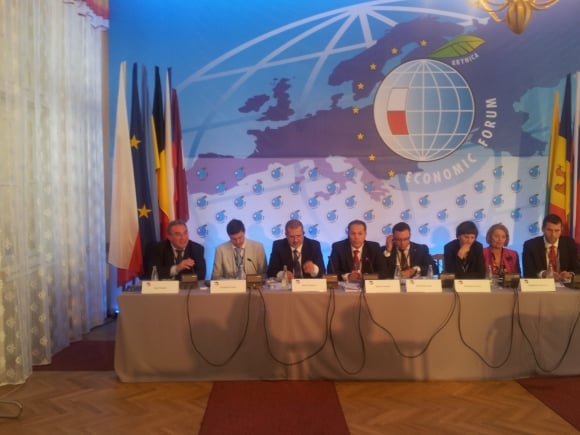Despite their different living conditions and objectives the ethnic minorities have recognized that they all want to secure their rights on the EU level. The Minority SafePack Initiative is the result of their common aim. The Initiative was registered at the European Commission, which will deliver its answer on the proposal in the next days – stated MEP Iuliu Winkler during an international security debate organized in the framework of the 23rd Economic Forum in Krynica, Poland.
During the panel A potential for conflict? Ethnic minorities in Central and eastern Europe the MEP representing the Hungarian community in Romania expressed his conviction that minority communities from all over Europe, including Hungarians from Romania, Germans from South Tyrol or Danish from Germany, to name but a few expect EU level solutions for their specific problems. Beside them ethnic minorities from candidate countries and others from the region look carefully how the EU is tackling these topics. All minorities would like to have their minority rights secured – stressed MEP Winkler.
Speaking about potential ethnic conflicts the Member of the European Parliament recalled a relevant moment of the recent history of Romania. In 1990, just a few months after the fall of the communist regime in Tirgu-Mures – Marosvásárhely, in the central part of Romania, an interethnic conflict erupted between Hungarians and Romanians, with casualties and wounded people on both sides. It was a crucial moment, when the leaders of the Hungarian community in Romania have wisely decided to use the tools and means of the parliamentary democracy in their fight for minority rights, thus avoiding the escalation of the conflict or an even more tragic outcome. Since that moment the representatives of the Democratic Alliance of Hungarians in Romania consistently respected that political decision working in the local governments, the Romanian Parliament and – since Romania’s accession to the EU – in the European Parliament as well, for the benefit of the Hungarian community and for the fulfillment of their goals. The RMDSZ is the only political force from the Romanian Parliament which has never changed its name and principles during the 23 years since the fall of the communist regime.
Iuliu Winkler has spoken also about the responsibility of the EU which avoids tackling ethnic minority issues. The minorities are more than European value; they are an important asset of to the EU, which should grow up to its responsibilities, being an example for the countries from the region in addressing the problems of the national minorities.
Representatives from Slovakia, Moldova, Russia, Ukraine and Lithuania contributed to the debate, speaking about the potential conflicts in the Central and Eastern Europe region and respective solutions. Answering a question from the audience MEP Winkler stressed that the EU should also address the Copenhagen-dilemma: during the accession negotiations the EU demands from the candidate countries the fulfillment of strict political criteria, including the legal situation of the national minorities, while after the accession there is no such demand. This is an obvious double standard which should be tackled by the EU institutions – stressed MEP Winkler.
More about the 23rd Economic Forum in Krynica at http://www.forum-ekonomiczne.pl/xxiii-economic-forum-2013/?lang=en#.UiiksTamh8F
Iuliu Winkler: A minority protection framework is required in the EU








